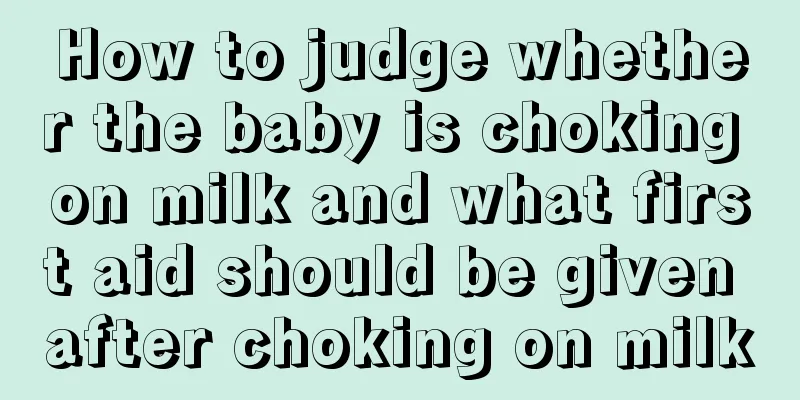Should salt be added to baby food? Can salt be added to baby food?

|
Making baby food is a gradual process. As the baby grows, the food needs to be constantly changed! Today, the editor of No. 5.com will introduce to you whether salt should be added to baby food? Can salt be added to baby food? Should salt be added to baby food?When the baby is 4-6 months old, you can gradually try to combine cereals, vegetables, animal foods, and eat some fruit every day. It should be noted that parents should not add salt or seasoning when making complementary foods, but can add a small amount of cooking oil. Why is this? Because the kidney function of infants is not fully developed, adding salt too early will increase the burden on the kidneys and make the baby prone to fatigue and sleepiness. The editor recommends not adding salt when preparing complementary foods for babies under 8 months old. How old can you add salt to your baby?Child health has always advocated that children should have a "low-salt diet", but there is no clear regulation on the amount of salt that children should consume. The Chinese Nutrition Society recommends 200 mg of sodium for infants under 6 months old, which is only 0.5 grams of salt when fully converted, and other ingredients in food also contain a certain amount of sodium. Therefore, there is no need to add salt to complementary foods for babies under 6 months old. After 6 months, the baby's kidneys are more fully developed and can start eating low-salt foods, but be careful to keep the amount small. For example, when making egg custard, you can dip chopsticks in a little salt. Dip in salt no more than twice a day. Foods to avoid in complementary feedingFor your baby's health and to reduce allergies, do not let your baby eat the following foods casually at the beginning. It is better to be cautious. Foods containing gluten: Babies under six months old cannot eat any food containing gluten, such as flour, oats, etc. Any food that is prone to allergies should be added as late as possible. Sugar: Do not add sugar to your baby's food. Eating too much sugar will increase your baby's risk of tooth decay. In addition, rapid changes in blood sugar may cause your baby to become emotional, especially crying and making a fuss. Doudou never adds sugar to his diet. He mainly uses the natural sweetness of fruits and vegetables to make his baby's complementary food delicious. Honey: Because honey contains a kind of bacteria that can cause infection or even poisoning in babies, you should never give honey to babies before they are one year old. Some parents say that babies need to drink honey water when they are constipated, but you should never add honey before they are one year old. It is recommended to use orange juice or plum juice instead of honey to treat baby constipation. Eggs: Eggs are a food that can easily cause allergies. Try to add them later, and make sure the eggs are fully cooked before feeding them to your baby. Egg yolks are added when your baby is nine months old, but egg whites should be added later because they are more likely to cause allergies. Nuts: In the UK, nuts are not allowed to be added until the age of 5. Firstly, they are prone to allergies, and secondly, they can easily get stuck on the baby, which is dangerous. Milk: Babies should be breastfed or fed formula milk until they are one year old before adding milk, because milk lacks important iron and vitamin C. In the first six months after adding complementary foods, babies should still drink 500 ml to 800 ml of breast milk and formula milk, but the milk at this time can be used to cook some dishes. Strawberries and kiwis: Strawberries are the most likely fruit to cause allergies, especially if your baby has asthma or eczema. Kiwis can only be given to babies over 9 months old, and should not be given to babies under 9 months old. Seafood: Try not to feed seafood to babies under one year old, as it is prone to allergies and can cause food poisoning if not cooked properly. High-fiber foods: High-fiber foods are very healthy for adults, but they will affect the baby's absorption of important trace elements. Do not give them to babies before the age of two. |
<<: How many months can babies eat oil? How old can babies eat oil?
>>: Can salt be added to baby food for seven months? At what age can babies eat salt?
Recommend
Can a one-year-old baby eat shiitake mushrooms? At what age can a baby eat shiitake mushrooms?
Shiitake mushrooms are a type of fungus food, and...
What medicine should children take after vomiting? What food should children eat after vomiting?
Vomiting is a very normal phenomenon. Many childr...
What complementary food should a 6-month-old baby eat? Analysis of daily complementary food additions for a 6-month-old baby
Daily recipe calendar for baby food supplement. T...
At what age does a child enter the rebellious period? How should a child be guided during the rebellious period?
The rebellious period has become an indispensable...
Does Colgate toothpaste have tin foil seal? Does Colgate toothpaste contain fluoride?
I feel that the Colgate toothpaste I bought befor...
What causes fetal toxins? What is the best time to remove fetal toxins?
Fetal toxicity is a very common phenomenon, and t...
How to treat insufficient milk after childbirth? Five treatment methods for you to choose
The most embarrassing thing about feeding a baby ...
How to treat Buddhist students? More humor and more love
On the surface, "Buddhist students" are...
What to do if you have pain and bleeding during intercourse after a cesarean section? How to avoid pain and bleeding during intercourse
If you experience pain and bleeding during sex af...
The difference between hand mask and hand wax. Which is better, hand mask or hand wax?
Have you ever used hand masks? Have you ever used...
How to apply for a newborn medical insurance card? New parents must know
Newborn babies have low immunity and are prone to...
What should I do if my child keeps crying? How should I discipline my crying child?
Many parents are at a loss when their children cr...
Can a three-month-old baby use a pillow? How many centimeters can a three-month-old baby use a pillow?
Pillows are something we almost always use when w...
Recommended foods for postpartum weight loss and avoid misunderstandings about postpartum weight loss
I believe that many mothers who have just given b...
Can babies eat cauliflower? At what age can babies eat cauliflower?
Cauliflower is a vegetable rich in nutritional va...









